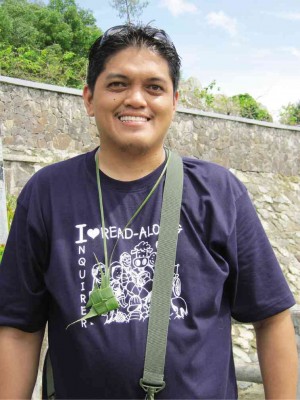The story of ‘Toots’ Querubin

GERALD QUERUBIN: This photo was taken when he attended the Inquirer Southern Luzon bureau meeting in 2011. JOANNA LOS BAÑOS
There was so much more to the byline of Gerald Gene R. Querubin, the Inquirer’s correspondent of eight years in Marinduque.
In his native town of Sta. Cruz, he was a community worker, an environmentalist and a mentor.
“Toots,” Querubin’s nickname, came from “Tot,” his grandfather’s pet name for him when he was a child. His elder sister, Sheila, 40, remembered a quiet boy who would often shut himself in his room and read his books.
“Between us, he’s the loner and I was more like the extrovert type,” Sheila said. “I remember when we were in grade school, he would run to me when the other kids bullied him.”
Toots indeed grew into a very private person. He talked less, but worked hard building his community and inspiring the youth.
Article continues after this advertisementHis death on Saturday, June 29, at the age of 38 came as a shock to his family and colleagues.
Article continues after this advertisement“We may not have spent much time together but the bond has become so strong that such loss we all feel deep, deep down,” wrote Melvin Gascon, Inquirer Correspondents’ Guild president and Nueva Vizcaya correspondent, on Facebook.
Love for Marinduque
Toots’ former student, Ahy Ien, said Toots “never thought twice about helping other people,” and remembered having both a teacher and a friend in him.
“You’ve taught me a lot of things, not just (academically) but also to be true to myself,” another former student, Japoy Historillo, said.
Glecy Danao, also on Facebook, promised to keep in mind what her former teacher always told them: to “pay it forward.”
After college at the University of the Philippines in Diliman, Quezon City, Toots worked in a coffee company that offered him a job in Malaysia.
“He could have gone abroad, but he said he’d rather go back to Marinduque and teach,” Sheila said in a phone interview.
Toots taught Philosophy and Humanities subjects at Marinduque State College in Boac and at Sta. Cruz Institute, the same year he began writing for the Inquirer.
In 2004, he cofounded the Marinduque Youth Volunteers Corps, a school-based youth organization.
Sheila, who stays in Laguna, recalled once she came home to Marinduque and saw the sacks of noodles and goods. “Toots said he collected them for donations to poor families and calamity victims,” she said.
Green tourism
Toots also invited speakers, even rock bands, from Manila to Marinduque. “He said he wanted his students to see the bands perform, as not everyone could afford to go to Manila,” Sheila said.
She said it was his brother’s way of promoting the island province, particularly the virgin caves and the long beaches of the Maniwaya island in Sta. Cruz. His advocacy was “green tourism.”
Among the four siblings, it was Toots who took after the parents’ love for public service. He wanted to run in the 2007 local elections but decided not to because their father, Yolando Sr., was a provincial board member then.
He took a leave of absence from the
Inquirer and ran for municipal councilor in Sta. Cruz in May but lost. During the campaign, he went house to house, collecting peso coins in a project dubbed “Piso para sa Bayan.”
‘Piso para sa Bayan’
“The money went to every village (in Sta. Cruz) to buy books for students.
He may have lost in the elections, but he was still able to serve,” Sheila said.
Toots never married. She believed it was his brother’s decision to look after their elderly parents.
“Our mother would always say the little money he earned, he would spend on other people. But we let him be, because we knew he was very fulfilled,” she said.
From his hospital bed when Toots was confined early in June after undergoing angioplasty due to a heart condition, he remained passionate about his environmental advocacy and told his sister about a research he was doing on the lingering effects of the mine tailing that Marcopper Mining Corp. had spilled into the Boac River in 1996.
It was a story that he never got the chance to write.